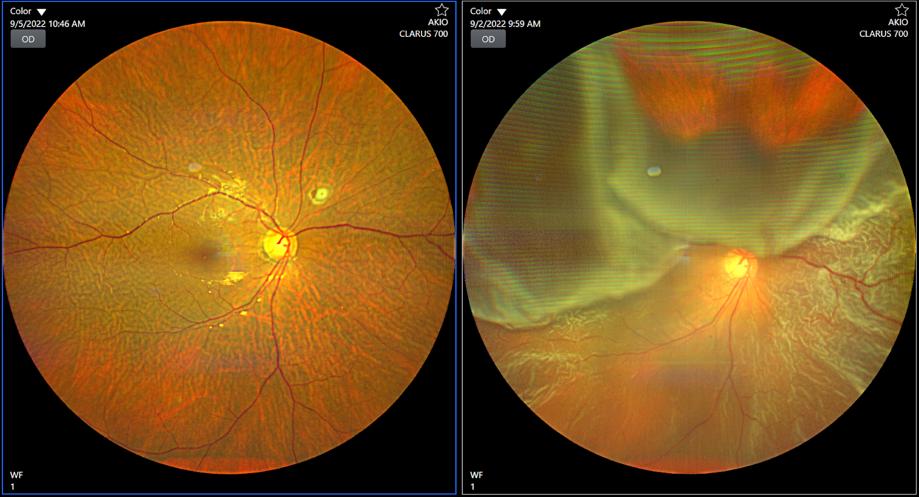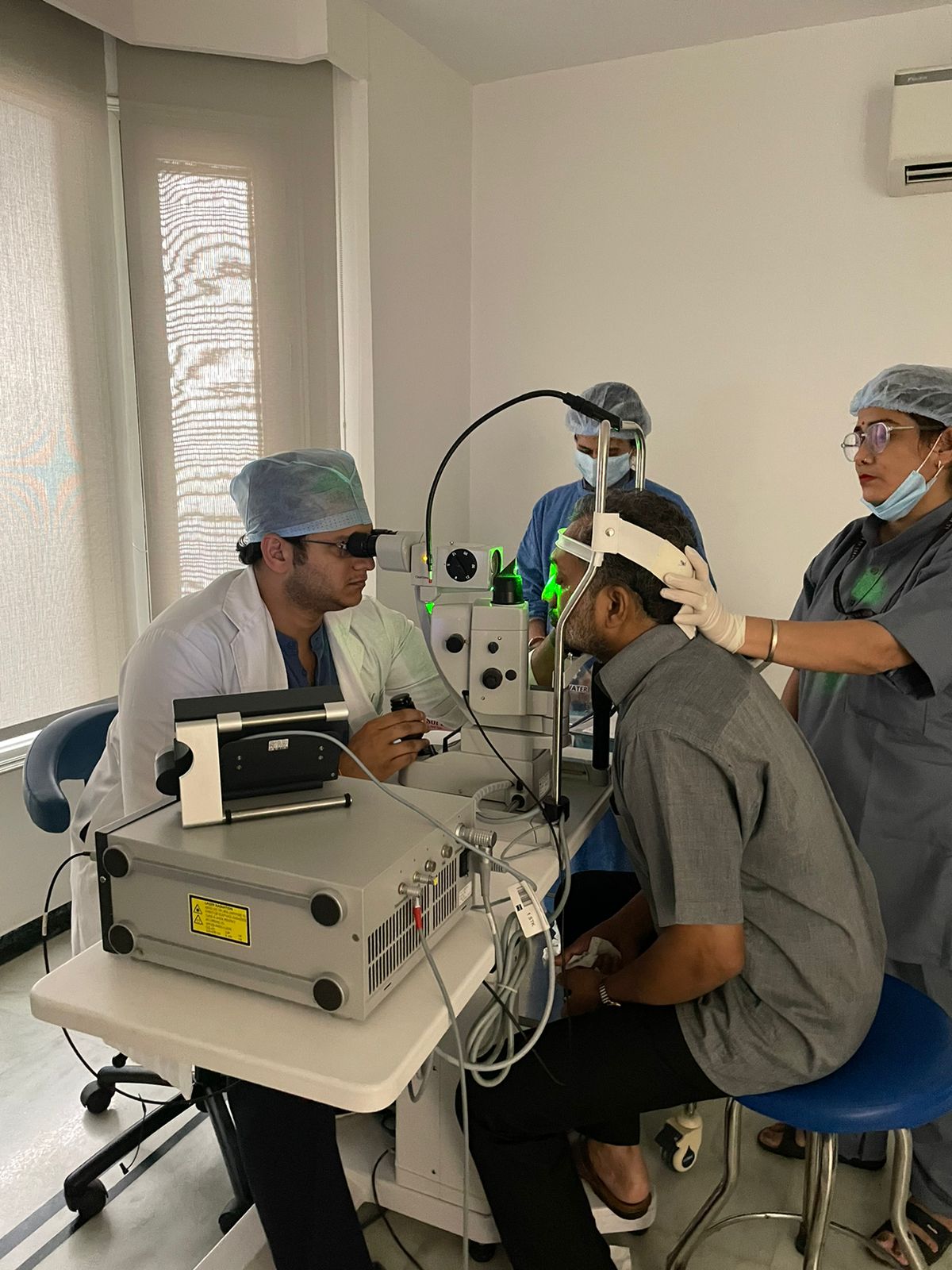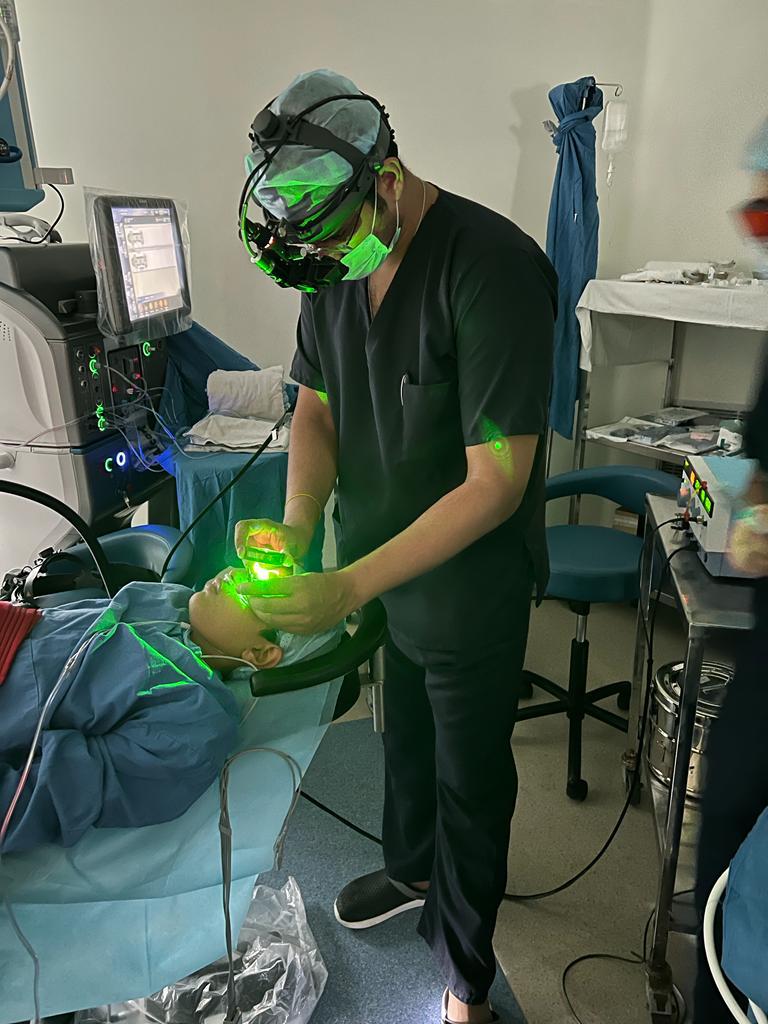

Vitreo-retinal diseases are conditions that affect the structures of the eye called the vitreous (gel-like fluid in your eye) and the retina (layer of cells at the back of your eye).
This mainly refers to the detachment of the retina from the layer underneath. If it is not taken care of properly, there is a chance of permanent vision loss.
A complication caused by Diabetic Retinopathy, this is the thickening of the retina due to accumulation of fluid.
Age-related Macular Degeneration:
This is when the macula, which is responsible for sharp, central vision, gets damaged as we age.
Central Serous Chorioretinopathy:
This is when the fluid builds up under the retina, causing it to detach, leading to distorted vision.
This is when the veins that carry blood from the retina get damaged, leading to vision loss.
This is the formation of cells inside your retina. It can cause blurry vision.
This is a defect in the iris of the eye that occurs during childhood, and may lead to reduced vision.
A macular hole is a small gap that opens at the centre of the retina, in an area called the macula.
If you are experiencing progressive loss of night vision, central or peripheral vision, it’s crucial to consult the best retina specialist in Delhi immediately. Early diagnosis and treatment by a qualified vitreo retinal surgeon can help preserve your vision and prevent complications.
Advanced Retina Treatments Available at AKIO
Depending on the severity of your condition, our specialists offer treatments such as:
India’s First 3D Micro-Incision Vitreo-Retinal Surgery
At AKIO, our expert team of retina specialists in Delhi NCR performs advanced 3D Micro-Incision Surgery — a minimally invasive approach to treat complex conditions like retinal detachment, macular hole, and diabetic retinopathy.
With over 41 years of excellence, AKIO is among the most trusted choices for retina surgery in Delhi.


These conditions can result from:
Diabetes (leading to diabetic retinopathy)
Aging and macular degeneration
Eye trauma or injury
High myopia or retinal thinning
Inflammatory diseases like uveitis
This is a laser method that scars abnormal structures in the retina.
Special medications are injected directly into the eye.
This surgery removes the vitreous gel from the eye and replaces it with a saline solution.
This technique uses extreme cold to destroy abnormal retinal tissue.
This procedure involves placing a silicone band around the eye to hold the retina in place.
This procedure involves injecting a gas bubble into the vitreous cavity to push the retina back into place.
If you experience:
You might end up with conditions like retinal detachment or severe retinopathy, which requires you to have surgery, so consider scheduling a consultation with your nearest retina eye specialist.
It is also important to note that these symptoms don’t necessarily mean that you have a vitreo-retinal disease, as these signs can also occur with other eye diseases, so it’s important to talk to an eye care professional for proper evaluation and management.


You have come to the right place!
AKIO ensures:
At AKIO, our Best Retina Eye Specialist in Delhi and experienced Retina Surgeon & Doctor can help diagnose and provide comprehensive retina and vitreous treatments, offering personalised care and discussing the best treatment options tailored to your specific needs
If you’re looking for the best retina eye specialist in Delhi, AKIO provides expert care and accurate diagnosis to manage these causes effectively.
General Questions For You
If you are experiencing changes in your vision, or any problems related to the retina, it’s vital to consult a specialist.
AKIO is committed to providing care with the most advanced diagnostic tools available. Our state-of-the-art imaging includes:
AKIO offers various medical management options for vitreoretinal diseases like:
AKIO is equipped with the 3-D Micro Incision Vitreo-Retinal surgery and expert surgeons that perform advanced retina surgeries like Retina Detachments, Diabetic Micro Incision vitreous Surgery, Macular Hole surgery, Epiretinal Membrane, etc.
Some other options for surgical treatments at AKIO are:
Usually, the treatment is safe with minor chances of complications.
AKIO’s top retina specialists in Delhi provide one-on-one guidance throughout the treatment, including post-surgery follow-ups, thus reducing risk factors to a minimal level.
The treatment of vitreo-retinal diseases is generally performed under local anaesthesia, and discomfort during the procedure is usually minimal.
After the treatment, some patients may experience mild discomfort or soreness in the eye, but this can be managed with appropriate medications and typically resolves within a few days.
The recovery process after vitreo-retinal disease treatment can vary depending on the type and extent of the treatment performed.
Some patients may experience a quick recovery, while others may require a longer time to heal. Your eye care professional will provide you with specific post-treatment instructions and guidelines for a smooth recovery.
Diabetic Retinopathy and Diabetic Macular Edema is a diabetic complication that occurs due to damaged blood vessels in the retina.
Diabetic Macular Edema is a common complication of Diabetic Retinopathy in which fluid accumulates in the macula, causing it to swell, and lead to vision loss. In both cases, treatment is crucial.
Age-related Macular Degeneration is a progressive eye disease that affects the macula.
It can occur in either dry or wet form, with the wet form being more severe. If you experience blurry or distorted vision, or shadow in the center of vision, you may require a treatment.
Central serous chorioretinopathy is a retinal disorder in which fluid accumulates behind the retina, resulting in vision loss.
It affects men more frequently and occurs between the ages 20 and 50. Most of the cases resolve spontaneously and gain normal vision.
Retinal vein occlusion occurs when there’s a blockage in the veins that carries blood away from the retina, which can cause vision loss.
Macular hole is when a circular opening forms in your macula. As the hole forms, things in your central vision will look blurry, wavy or distorted. As the hole grows, a dark or blind spot appears in your central vision. A macular hole does not affect your peripheral (side) vision.
ERM occurs when a thin layer of scar tissue accumulates on the surface of the macula and distorts your vision.
It can occur due to multiple reasons, like eye surgery, inflammation, or trauma.
Iridofungal Coloboma is an uncommon eye disorder in which a hole occurs between the iris and the retina. Depending on its size and location in the eye, it may lead to vision loss or vision distortion. Its treatment options vary from observation, glasses, and surgery, depending on its severity.









